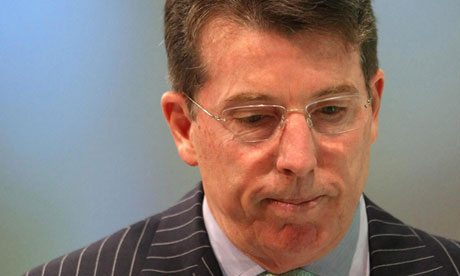Mr Diamond called the behaviour of those responsible for the Libor rate-rigging at the bank “reprehensible” reports The BBC.
But Andrew Tyrie, chairman of the Treasury Committee, said some of what the banker said seemed “implausible”.
And another committee member, David Ruffley, said he was not satisfied with Mr Diamond’s explanation.
During three hours of questioning by the Treasury Committee, Mr Diamond said he had only learned the true extent of the scandal this month.
He had felt “physically ill” when reading incriminating emails from traders that they had conspired to manipulate the Libor rate.
Mr Diamond said he “loved” Barclays and had resigned on Tuesday to protect its reputation: “I’m sorry, disappointed and angry.”
But Mr Tyrie, who has been asked to lead a parliamentary inquiry into banking following the scandal, was sceptical about some of what he heard.
He told the BBC after the hearing: “We learnt that Bob Diamond says he didn’t know anything about this until about month ago, which I find rather surprising.
“I think, cumulatively, the whole package looks somewhat implausible. And if it is plausible, it’s only because there is something wrong with the culture of Barclays and, of course, it’s the culture that needs to be put right.”
In a separate BBC interview, committee member David Ruffley said: “Either [Mr Diamond] was complicit or, frankly, incompetent.
“It was quite shocking testimony, in the sense that there was serious wrongdoing and he didn’t know about it,” the MP said. “Heaven knows what else was going on inside the bank.”
In another development, the Bank of England’s deputy governor, Paul Tucker, has asked to give evidence to the Treasury Committee in order to give his side of the story.
“Mr Tucker is keen to give evidence to the committee in order to clarify the position with regard to the events involving the Bank of England, including the telephone conversation with Bob Diamond on 29 October 2008,” the Bank said in a statement.
John Mann, a Treasury Committee member, confirmed on the BBC’s Newsnight that Mr Tucker would appear some time next week.
On Tuesday, Barclays released Mr Diamond’s note of a conversation in 2008 with Mr Tucker.
In it, Mr Diamond wrote that Mr Tucker told him “senior figures within Whitehall” were concerned about why Barclays was setting its Libor rate at the “top end”.
Subsequently, the Libor borrowing rates submitted by Barclays fell, potentially understating the extent of the bank’s borrowing costs.
Banks borrow from each other daily, and report at what rate they got the money. A high rate can indicate a bank is having trouble borrowing money because it is in financial trouble.
Mr Diamond told MPs that Mr Tucker had not identified these “senior figures” in Whitehall.
The former Barclays boss reiterated that he did not view his conversation with Mr Tucker as an instruction to change its rates submissions.
But Mr Tyrie suggested to Mr Diamond that the conversation with Mr Tucker could have been interpreted as “a nod and a wink”.
“It reads that way to almost anyone who looks at it,” said Mr Tyrie.
Mr Diamond has subsequently relayed his conversation with Mr Tucker to Barclays’ chief operating officer Jerry del Missier.
But Mr del Missier, who also resigned on Tuesday, had “misunderstood” the conversation, and directed traders to take actions to lower Barclays’ Libor rates.
The Financial Services Authority has investigated Mr del Missier’s actions, and will take no further action.
Meanwhile, Chancellor George Osborne has directly accused members of Gordon Brown’s government of involvement in the rate-rigging scandal.
Mr Osborne said the former prime minister’s inner circle, including current shadow chancellor Ed Balls, had “questions to answer” over apparent pressure on Barclays to post lower Libor rates during the credit crunch.
The comments came in an interview for Thursday edition of the Spectator magazine.


